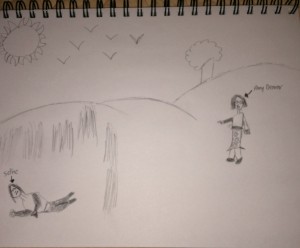Monster
Submarine.
Everyone has off days. Days where we aren’t ourselves. Your days always recap in your dreams, if not the same, differently, but they seem to always to relate to each other. I’m having a bad dream. “Wake up Gregor! Wake up!” I keep repeating it to myself, over and over. After eternal seconds, I wake, only to wish I didn’t. Is it just a chain of nightmares? Is my mind playing games with me? I think to myself, “I need glasses,” and, “I may be under the weather.” But after a few seconds and minutes pass by, the only words repeating again are, “wake up.”
Click. Click. Click. My skin is no longer skin. Click. Click. Click. My stomach is now slightly domed and hard. “Wake up,” I repeat. Click. Click. Click. Some of my senses are now determined by these brown and fuzzy antennae. This cold weather and snow outside the windows don’t make the shaking any better. Brown stiff sections cover my stomach, I dared not look at my legs. I try to lift them: small, skinny, fuzzy, multiple. My voice, like an alien; unrecognizable. What has happened?! How can I explain this to everyone at work? No one would believe me. My 15 years of service at my job, and never have I missed, but everyone would get suspicious. How embarrassing! Everyone will notice me. I already missed my train, but may catch the next one. What the hell do I do now?
I can’t let my parents see me, especially not my mom, her poor little heart won’t be able to cope with the fact that her young boy has turned into an ugly creature. A monster. It’s almost funny how fast people change. Funny how we take our hands and feet for granted on a daily basis. No, not funny at all.
It is now a quarter after 7. The door knocks and out comes my mother’s voice, “Gregor! Are you alright sweetheart? Are you feeling under the weather? Is there something that I can get you?” She hasn’t heard my voice until now. “I’m fine mom!,” I replied, and I felt her vibe: concerned. She tells me that the chief clerk has arrived to my house to see how I’m progressing. I tell him that I’m doing better, that I’m just getting ready to get the 8 o’clock train, and to not worry about me. But who am I kidding? I’m befuddled. My present state of mind is completely off the charts.
My goal was to go to work. I open the door and allow them to see my present state. I am no longer human, but a vermin. “MY GOODNESS!”, says the chief clerk. Mother starts to weep, while father holds her and steps back, as if I am a monster. My sister in shock: blank face, eyes popping, jaw dropping. The painful quietness filling up everyone’s ears. Everyone’s fear radiates the hallway. I feel everyone’s eyes on me, except for my poor mother. Her eyes red, I’m no longer her good boy, I am the family burden.
The family burden I remained. For the following two weeks, my own parents didn’t come into my room. I didn’t leave it. My room has become the shell that never comes off the turtles’ backs. I am my own company. My little sister , Grete, is the only one who is capable of coming into my room, but it isn’t to see me. Grete has grown dramatically, and has tried to take over the role I played in the family. She cleans and fixes my room and cleans the debris I leave behind. Property is destroyed from the acidity of my bodily fluids. They make this horribly disgusting sound, almost like a huge wet tongue covered in thick saliva, except it’s a thousand times louder. My mom still doesn’t dare to see me.
Grete was my only hope to having contact with society, and not just talking to myself all the time. As a man, I had a responsibility of working and providing for the family. I am no longer the provider in the family, which is a shame, almost as if I am stripped from my manhood. I am no longer a man. I am less than a person: a waste of life. You see, I thought Grete was a good child, covering for me while I am ill, but it wasn’t the case.
With the door always closed, outside sounds sound hollow: deep. I overheard Grete talking to my parents about me being too much to handle. I thought she was different, my little sister, has now turned her back on me and not taking care and responsibilities on me. I rue the day this all started. My family and friends are nothing but stranger now and it’s painful. Sometimes my brain goes on overload. There’s not much i can do when I’m by myself surrounded by four walls and the shaking sound of my antennae. I will go to sleep now, sleep makes everything better.
In “Metamorphosis” by Franz Kafka, the story of a man who converted into a vermin is told in a third-person narration. The whole story focused a lot on how his life affected everyone around him, rather than the effect it had on him. While reading the story, I felt it was a lot more important to show how it affected him rather than everyone else, because, after all, the change did happen to him, and not anyone else. In my retelling of the story, I change the narration from third-person, to first-person. In the short story, “Monster,” my version of “Metamorphosis,” I allow the reader to get a glimpse of what it was like for Gregor Samsa after becoming a vermin.
As a person living in a big city in the 21st century, I felt like the whole story symbolized a lot of the problems that we have now. In my eyes, I felt it was something that our society has not accepted yet, and is seen as a monster to everyone else but themselves and alike-people. I felt like the Gregor’s mother represented society’s lack of acceptance towards the situation. Towards the end, Gregor dies, and everyone is relieved, which in my eyes, it interpreted as a suicide of the unaccepted group in our society, because society, up until now, kills what they don’t like. In my retelling, I managed to focus on the pain and neglect that Gregor went through after being transformed.
In the beginning of “Metamorphosis,” Gregor wakes up from a chain of nightmares, and it’s the point in the story where he realizes he is no longer human. In my interpretation of the story, I felt like it was still that lack of acceptance, and this is the point where he starts to think of how it would be like when the problem is faced in reality. “What has happened?! How can I explain this to everyone at work? No one would believe me. […] How embarrassing,” (second para…Monster). I made Gregor’s character panic more than the original version just to emphasize the drastic changes and how hard it is for him to deal with something like that. In all situations in real life, one has to accept things first in order for others to take you seriously. I felt like his character didn’t do that because his parents and sister would walk all over him and neglect him, so I made him a lot weaker in order for that to stand out later on in the story where Grete’s character turns on him.
“Metamorphosis” kept relating to society, in my eyes, and I felt like some examples of social issues we have had or still have today are things such as blacks versus whites, and straights versus gays. In both issues, the ones who don’t accept, is the monster in the other’s eyes. When one is not accepted by the other, they tried to strip them from as many rights as possible in order to eliminate them as a whole because they aren’t viewed as a “person.” Gregor was being punished by removing his prized possessions.
“Gregor kept trying to assure himself that nothing unusual was happening, it was just a few pieces of furniture being moved after all […]. He was forced to admit to himself that he could not stand all of this much longer. They were emptying his room out; taking away everything that was dear to him […].” (Kafka 15)
I felt Gregor was being stripped from his manhood once he didn’t take the responsibility of providing for the family. I felt like everyone thought it was his fault that he turned into a bug, and that he could have prevented it from happening, so they wanted to take away things because they felt he didn’t deserve. In the story, Grete thinks that the furniture “was of no use to him at all,” although it was true, Gregor clearly states that he felt like crap when Grete was taking the furniture out of his room, although he wanted to help, they wouldn’t let him and he felt they didn’t care what he wanted to do, they just wanted him out of their way. In my story, I used the fact that he could not go back to his job as a way to explain the responsibilities that he had to take care of as a man in the house, and how he is being frowned upon because he can no longer be the one who provides in the house and he is now being rejected from his family and now is a family burden. “My room has become the shell that never comes off the turtles’ backs. I am my own company. […] I am no longer a man. I am less than a person: a wasted of life.”
At the end of the story, Gregor dies and everyone is relieved because they can get a break from him and working. I felt like they didn’t really care for their loss and were content with the outcome. In our society, people would do anything to end something they don’t like. In this case, Gregor’s family wanted nothing to do with him; they wanted to get rid of him, especially Grete. He knew they didn’t want him in their lives anymore. She says, “[…] we can’t carry on like this. Maybe you can’t see it, but I can. I don’t want to call this monster my brother, all I can say is: we have to try and get rid of it” (Kafka 22). In my story, he dies almost like with a suicide. He felt the rejection and he felt it was best to just sleep. My ending is almost like he forced himself to die to make others happy.
I felt it was a lot more important to tell the story through the main character’s eyes. If society saw things through everyone’s eyes, a lot more things would be accepted. And if everyone knew Gregor’s true emotions and the crap everyone put him through for something that he couldn’t change or even picked to be, they wouldn’t treat him as badly as they did in the story.





